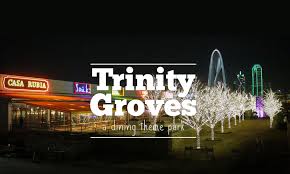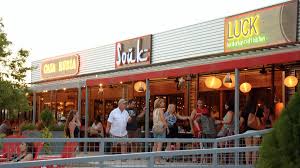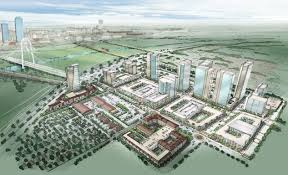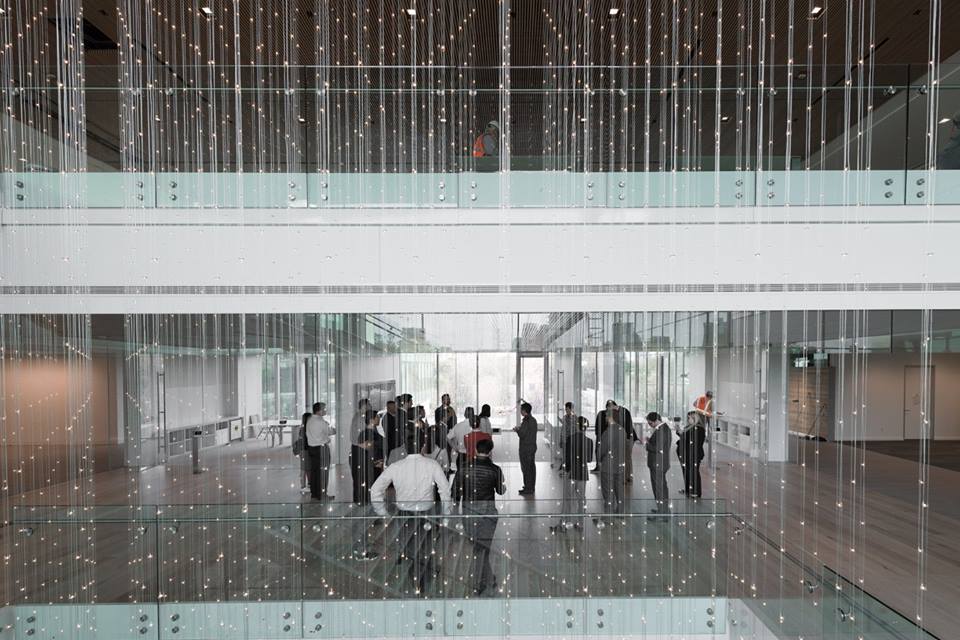January 18-21, 2017 The Cornell Baker Program in Real Estate Class of 2018 visited Dallas, Texas for their intersession trek. The purpose of the program’s case study trips is to expose Baker students to real estate markets with diverse characteristics, particularly those that contrast the familiar setting of the Northeastern United States and New York City. This disparity was immediately apparent in Dallas – an ever-growing city with limited physical barriers. Per the latest Census Data, Dallas was second in the nation in numeric population growth at 144,704 as well as leading the nation with employment growth at 3.6% (US Bureau of Labor Statistics). In addition to the immense expansion, Dallas is able to provide a variety of experiences for real estate students, from downtown investment to urban renewal to planned suburban communities.
Articles will follow to illustrate the class experiences.
Day 1: Trinity Groves (http://www.trinitygroves.com)
“Do you have the next greatest restaurant idea?” Currently home to fourteen such ideas, Trinity Groves houses a variety of restaurant concepts including a fish market grill, steakhouse, sushi restaurant, vegan eatery, craft beer kitchen and Asian-Mexican fusion anchor. The restaurants are incubator ideas, located in a renovated industrial warehouse. The setting is open, comfortable, and contemporary. This was the scene for the first stop of the Dallas Real Estate trek.
 Trinity Groves uses the above tag line on its website as it seeks new restaurant concepts that need an incubator space and financial funds to progress their “greatest idea” forward. The incubator model is somewhat reminiscent of the popular business-pitch television show Shark Tank. Future restaurateurs pitch their idea with hopes of receiving financial funding to the tune of $500,000 (with no financial liability on the entrepreneur side) for the restaurant space as well a salary to operate the restaurant. This gives Trinity Groves a 50/50 stake in the restaurant. The operators must have two key characteristics: 1) They function as an owner-operator not just a manager and 2) They are able to focus on the customers, “Get customers in first, make money second.”
Trinity Groves uses the above tag line on its website as it seeks new restaurant concepts that need an incubator space and financial funds to progress their “greatest idea” forward. The incubator model is somewhat reminiscent of the popular business-pitch television show Shark Tank. Future restaurateurs pitch their idea with hopes of receiving financial funding to the tune of $500,000 (with no financial liability on the entrepreneur side) for the restaurant space as well a salary to operate the restaurant. This gives Trinity Groves a 50/50 stake in the restaurant. The operators must have two key characteristics: 1) They function as an owner-operator not just a manager and 2) They are able to focus on the customers, “Get customers in first, make money second.”
The magic to Trinity Groves: all of the restaurants are incubators – no chains. This success in the restaurant space has led to its position as an anchor catalyst for apartment, condominium, hotel, and office uses. The apartments (Cyprus at Trinity Groves) are currently under construction and in the early stages of leasing. Major developers have bought into the benefits of the concept, and are seeking to purchase adjacent land for complimentary uses.
 Bob Sambol, operating manager for Trinity Groves, and Uno Immanivong, owner and chef at Chino Chinatown (one of the first and most successful restaurants at Trinity Groves) met to give us the compelling story behind the concept and development. Chino Chinatown is a fantastic Asian-Mexican fusion restaurant drawing upon the heritage of its founder as well as that of the Dallas area. Uno is not without prior experience, having participated in The Taste with Anthony Bourdain. Although her cooking is outstanding, the real success of the restaurant comes from her hospitality and attention to detail, ensuring that customers of Chino truly have a culinary experience.
Bob Sambol, operating manager for Trinity Groves, and Uno Immanivong, owner and chef at Chino Chinatown (one of the first and most successful restaurants at Trinity Groves) met to give us the compelling story behind the concept and development. Chino Chinatown is a fantastic Asian-Mexican fusion restaurant drawing upon the heritage of its founder as well as that of the Dallas area. Uno is not without prior experience, having participated in The Taste with Anthony Bourdain. Although her cooking is outstanding, the real success of the restaurant comes from her hospitality and attention to detail, ensuring that customers of Chino truly have a culinary experience.
The class was also privileged to have three Cornell Baker Program alumni from the classes of 2013, 2014 and 2015: Phillip Hy of JC Penney, as well as Ryan Bandy and Evan Smith. All three spent the evening with the class, providing personal insights on school and seeking meaningful internship experiences.
Trinity Groves is the brain child of Phil Romano, founder of Fuddruckers and Macaroni Grill, and created with partners Stuart Fitts and Butch McGregor. The partnership began purchasing property west of the Trinity River in 2005. At the time, the land was priced low, and lacked strong connection with downtown Dallas. Over a period of years, they assembled approximately 100 acres with 10.3 acres utilized for the restaurant incubator space. In 2012, the Margaret Hunt Hill Bridge (designed by Santiago Calatrava) opened. This immediately created an opportunity for an increase in value. Trinity Groves opened soon thereafter.

Trinity Groves was intended to provide an environment for creating new, innovative restaurant concepts and to catalyze future development as a long-term investment. With the bridge completed, and Dallas adding close to 150,000 residents annually, the timing has been perfect. It has truly created an anchor amenity that has added value and created demand for surrounding properties by driving traffic to West Dallas. The Margaret Hunt Hill Bridge provided a bridge to much more than just crossing the Trinity River – it provided a bridge to a real estate model that is changing both the restaurant world and the Dallas landscape.
The evening at Trinity Groves provided a great start to the real estate trip and introduction to Dallas. The Baker Program in Real Estate at Cornell appreciates the time given by Bob Sambol, Uno Immanivong, Phillip Hy, Ryan Bandy and Evan Smith.
For more information on Trinity Groves – see the ULI Case Study: http://casestudies.uli.org/trinity-groves/

